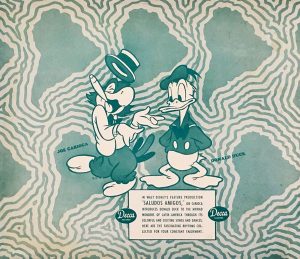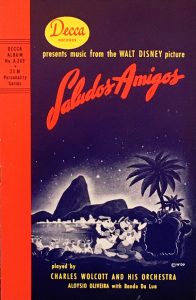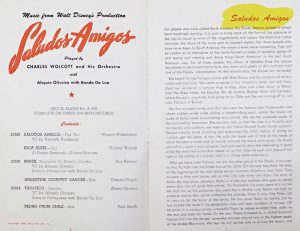With Disney/Pixar’s Coco premiering this week, here’s the first of a two-part Spin through Disney’s dance with Latin American musical artistry in the 1940’s.

Decca Presents
Music from the WALT DISNEY Picture
SALUDOS AMIGOS
Charles Wolcott and His Orchestra
With Aloysio Oliviera with Banda Da Lua and Kenneth Lundquist
Decca Records 23-M Personality Series A-369 / Three 10’ 78 RPM Discs / Mono / 1945 Running Time: 16 minutes.)
Song Written Especially for the Film: “Saludos Amigos” by Aloysio Oliviera, Charles Wolcott, Ned Washington.
Popular Songs Featured in the Film: “Brazil (Aquarela Do Brasil)” by Ary Barroso, S.K.Russell. “Tico Tico” by Ervin Drake, Aloysio Oliviera, Zequinha de Abreu.
Instrumentals: “Inca Suite (includes “Llama Serenade” and “Inca Princess”) by Charles Wolcott; “Argentine Theme” (from Gaucho Goofy) by Edward Plumb, Andrés Chazarreta, “Pedro from Chile” by Paul J. Smith.
 For all intents and purposes, this as close to a Saludos Amigos soundtrack album as one could get, even though it technically is not one. Victor’s 3-disc Snow White soundtrack had given the world its first true film soundtrack recording, then followed with Pinocchio and Dumbo. (Fantasia and Bambi had to wait for the LP to come along in the late ‘50s, (though the RCA Shirley Temple version of Bambi does contain soundtrack dialogue.
For all intents and purposes, this as close to a Saludos Amigos soundtrack album as one could get, even though it technically is not one. Victor’s 3-disc Snow White soundtrack had given the world its first true film soundtrack recording, then followed with Pinocchio and Dumbo. (Fantasia and Bambi had to wait for the LP to come along in the late ‘50s, (though the RCA Shirley Temple version of Bambi does contain soundtrack dialogue.
For the Saludos Amigos album, the decision was made to forgo the soundtrack in favor of the jukebox-format 78-RPM disc of the day. To make the songs—which were and are a highly marketable commodity once recorded or published—the optimum presentation was in the roughly three minute length of a single disc side.
What made Disney and Decca’s Saludos Amigos album unique was that the songs and instrumentals were recorded almost as if they were being made at the studio for the soundtrack, with many of the same musicians under the baton of conductor Charles Wolcott (who is awarded rare “star” credit throughout the album package and its lovely little program booklet).
The program booklet lists the musical sequence, the film synopsis, the “el grupo” story, a brief history of Walt and his studio. There’s even a section about Wolcott, explaining how he diversified his orchestra and its musicians:
“[He] has extended his wanted consciousness to the point of importing from South America—from Brazil, to be specific—seven musicians as an adjunct to his already fine orchestra. He feels that no orchestra, no matter how much ingenuity they may use, can approximate the peculiar timbre of a South American band—the quality that makes it unique and gives it its character.”
The “magic eight” instruments added for the score are listed on the next page: reco reco, cuica, pandiero, surdo, chocalho, cabaco and caxia.
The whole album is a joyful complement to the original, almost identical in tone. One exception is the theme, performed in this case by studio singer Kenneth Rundquist instead of a chorus, but because it had to be expanded for the record, there are more variations on the tune.
GIVE A LITTLE LISTEN
“Decca Records Presents Music from Saludos Amigos”
Note that each song is followed by an instrumental selection. This is to serve the pop/jukebox format to set up a potential hit vocal on side one. In this way, the album really doesn’t play like the later LP cast album format established by Columbia’s Goddard Leiberson or the LP soundtrack program of Disneyland’s Tutti Camarata.






Next week: We’ll take a look at Disneyland Records’ album of Saludos Amigos and Three Caballeros songs (some of the tracks from this album were also included on a Spanish language Three Caballeros LP we explored here).
The soundtrack to Disney/Pixar’s Coco has already been released for download or on CD. The film is the most musical of any Pixar feature, chock full of nods to the period and the musical magic of an era very much like that of Saludos Amigos and The Three Caballeros. The film’s theme of familial love enduring throughout eternity (as long as we never forget) extends to Pixar’s bridge between the constantly astonishing new forms of storytelling that thankfully never loses sight of the myriad inspirations from whence they came.


 GREG EHRBAR is a freelance writer/producer for television, advertising, books, theme parks and stage. Greg has worked on content for such studios as Disney, Warner and Universal, with some of Hollywood’s biggest stars. His numerous books include Mouse Tracks: The Story of Walt Disney Records (with Tim Hollis). Visit
GREG EHRBAR is a freelance writer/producer for television, advertising, books, theme parks and stage. Greg has worked on content for such studios as Disney, Warner and Universal, with some of Hollywood’s biggest stars. His numerous books include Mouse Tracks: The Story of Walt Disney Records (with Tim Hollis). Visit 






















































Luv Luv LUVVVV!!
Looking ahead, I’m guessing Disneyland Record’s South America album didn’t used Aurora Miranda’s original recording of her song in “Three Caballeros”, correct?
Neither used the soundtrack but the Spanish language LP did.
You have flac files, extract from this vinyl?